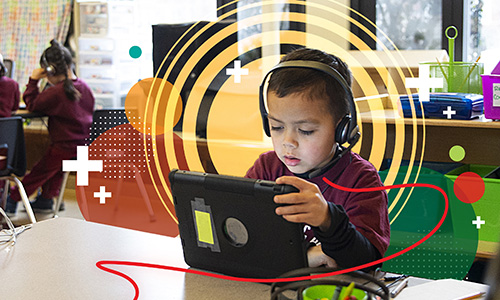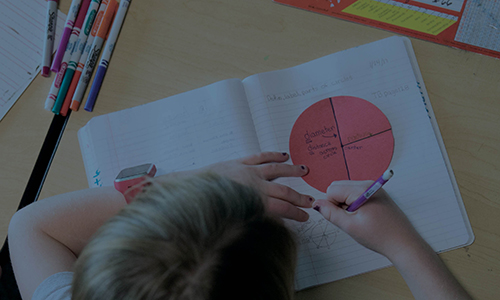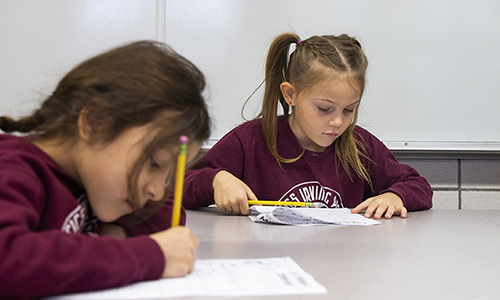Working paper
Impacts of school entry age on academic growth through 2nd Grade: A multi-state regression discontinuity analysis
2020
By: Angela Johnson, Megan Kuhfeld

Description
The belief that additional time allows children to become more ready for school has affected public policy and individual practices. Prior studies estimated either associations between school entry age and academic growth or causal effects on achievement measured at one or two points. This paper contributes novel causal evidence for the impacts of kindergarten entry age on academic growth in the first three years of school. We embed regression discontinuity into a piecewise multilevel growth model and apply it to rich assessment data from three states. Being a year older leads to higher initial achievement and higher kindergarten growth rates but lower growth rates during 1st and 2nd grades. Effects do not differ by gender or race.
See MoreTopics: Growth modeling, Early learning
Associated Research
Related Topics


Predicting Amira Reading Mastery Based on NWEA MAP Reading Fluency Benchmark Assessment Scores
This document presents results from a linking study conducted by NWEA in May 2024 to statistically connect the grades 1–5 English Amira Reading Mastery (ARM) scores with the Scaled-Words-Correct-Per-Minute (SWCPM) scores from the MAP Reading Fluency benchmark assessment taken during Fall and Winter 2023–2024.
By: Fang Peng, Ann Hu, Christopher Wells
Products: MAP Reading Fluency
Topics: Computer adaptive testing, Early learning, Measurement & scaling, Reading & language arts


MAP Reading Fluency with Coach Evidence Base
This document provides an overview of the research underlying MAP Reading Fluency with Coach’s AI-powered intelligent reading tutor and the research on key elements of early literacy instruction. It describes the components of the MAP Reading Fluency with Coach pedagogy and the research base supporting each component.
By: Amy Endo
Products: MAP Reading Fluency
Topics: Early learning, Empowering educators, Innovations in reporting & assessment, Reading & language arts


Typical learning for whom? Guidelines for selecting benchmarks to calculate months of learning
To describe the impact of the COVID-19 pandemic on students, researchers have translated test scores into months of learning to claim how many months/years students are behind in school. Despite its perceived accessibility, there are major downsides to this translation. To inform future uses by researchers and media, we discuss in this brief how to calculate this metric as well as its trade-offs.
By: Megan Kuhfeld, Melissa Diliberti, Andrew McEachin, Jon Schweig, Louis T. Mariano
Topics: COVID-19 & schools, Equity, Growth, Growth modeling, Seasonal learning patterns & summer loss


COVID-19 in the early elementary years: A comparison of achievement in spring 2019 and spring 2022
New NWEA research provides further evidence of the challenges that young learners are currently facing from the disruptions of the COVID-19 pandemic.
By: Megan Kuhfeld, Karyn Lewis
Topics: COVID-19 & schools, Early learning, Equity


Pathways of mathematics achievement in preschool: Examining executive function and task orientation
This study used longitudinal data from a sample of 467 preschoolers to examine (1) if children’s executive function (EF) skills at the beginning of pre-K predict growth in their mathematics achievement across the pre-K year, (2) whether growth in learning behaviors, specifically task orientation, mediate the associations between EF and mathematics achievement, and (3) if there are sex differences in these associations.
By: Tara Hofkens, Jessica Whittaker, Robert Pianta, Virginia Vitiello, Erik Ruzek, Arya Ansari
Topics: Early learning, Math & STEM


The purpose of this technical appendix is to share more detailed results and to describe more fully the sample and methods used in the research included in the brief, Learning during COVID-19: An update on student achievement and growth at the start of the 2021-22 school year. We investigated two research questions:
- How does student achievement in fall 2021 compare to pre-pandemic levels (namely fall 2019)?
- How did academic gains between fall 2019 and fall 2021 compare to normative growth expectations?
By: Megan Kuhfeld, Karyn Lewis
Topics: COVID-19 & schools, Equity, Growth modeling


To what extent has the COVID-19 pandemic affected student achievement and growth in reading and math, and which students have been most affected? Using data from 6 million students in grades 3-8 who took MAP Growth assessments in reading and math, this brief examines how gains across the pandemic (fall 2019 to fall 2021) and student achievement in fall 2021 compare to pre-pandemic trends. This research provides insight to leaders working to support recovery.
By: Karyn Lewis, Megan Kuhfeld
Topics: COVID-19 & schools, Equity, Growth modeling



